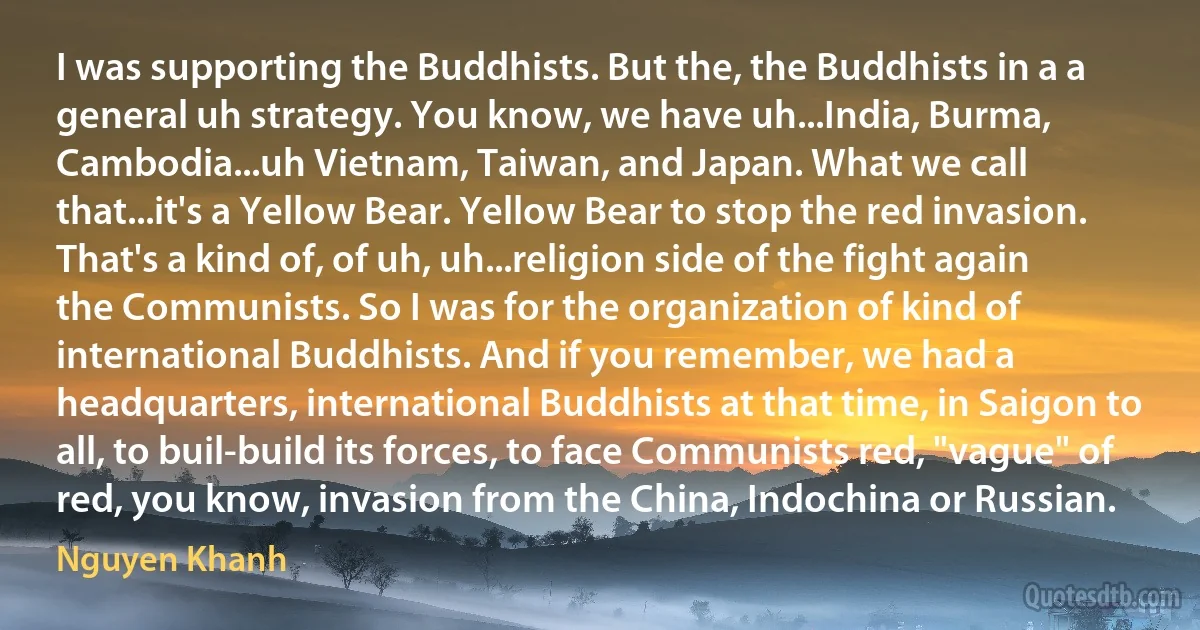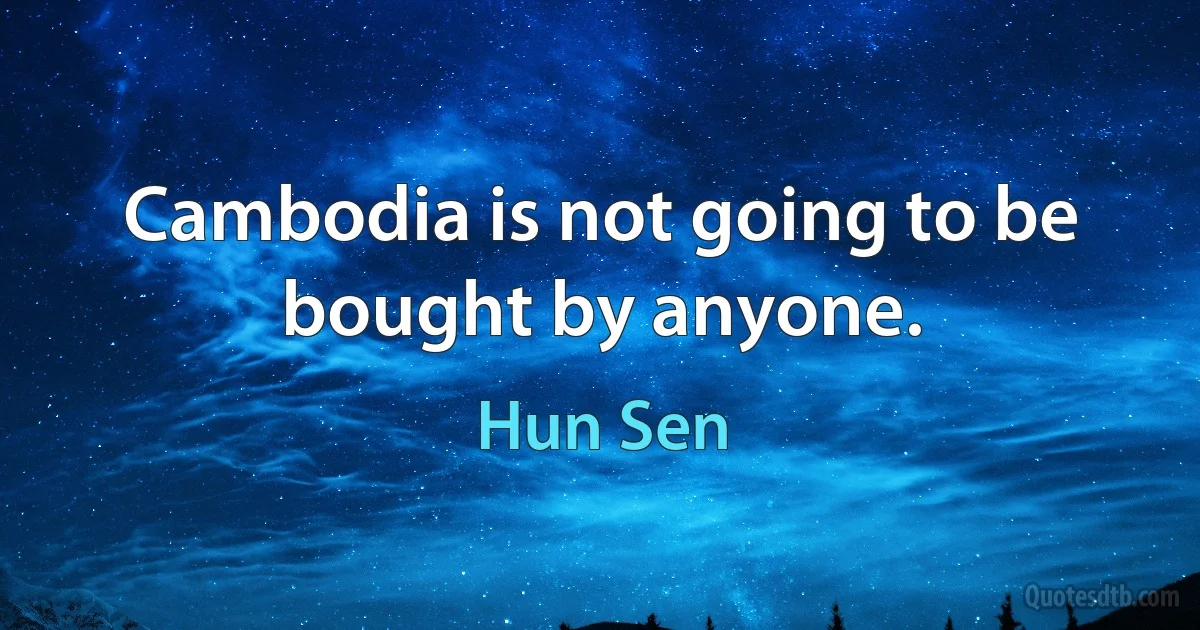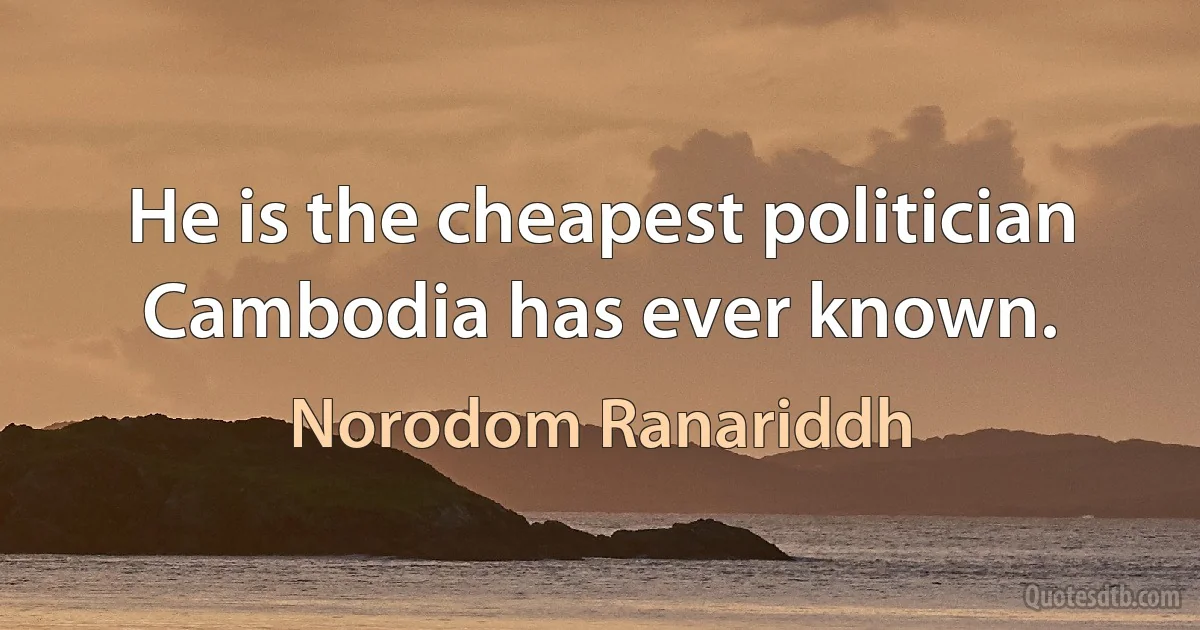Cambodia Quotes - page 2
Here, according to the mythology of the liberals, was a peaceful little country that Nixon attacked. The fact that there were four North Vietnamese divisions within 30 miles of Saigon coming across the border killing Americans-killing 500 a week starting within two weeks of Nixon's inauguration-was ignored in the debate on Cambodia by protesters emphasizing the technical neutrality of Cambodia and ignoring that its ruler had invited our response.

Henry Kissinger
He [Chomsky] has now been impeached by his own standards, since scrutiny of the evidence does not bear him out on Serbia or Afghanistan or Iraq. It didn't bear him out on Cambodia either, though he was never a "Holocaust denier" or anything like it. And he has, I think, ceased to be of any use to young people who might pardonably doubt the official story. The position he took, comparing the attack on the World Trade Center to an admittedly criminal Clintonian strike on Sudan (and virtually concluding that the latter was worse!) showed the absolute exhaustion of the glib "double standards" school, as I point out extensively in Love, Poverty and War. But his decline and fall is a loss, and you miss the point by denying it.

Christopher Hitchens
Before, when I was covering the war in Vietnam and Cambodia, we used to have what I call the three Ss. You would shoot a story, you would script a story, which is to write it and then ship the story. And if you were in Cambodia you'd go to the airport and try to find a pigeon to carry it out for you. Someone who was leaving Cambodia to go to either Bangkok or Saigon or Hong Kong because there wasn't the satellite technology. There was no uplinks then. Today, the second major change is also in personnel. Today you have so much satellite coverage you can report live why from a battlefield. Before you were often there just by yourself. Now you're likely to be with 20 other reporters. I just think there's more people out there covering the same story and covering it in a very different way because of the technological advances.

Ed Bradley
When the facts are in, it may well turn out that the more extreme condemnations were in fact correct. But even if that turns out to be the case, it will in no way alter the conclusions we have reached on the central question addressed here: how the available facts were selected, modified, or sometimes invented to create a certain image offered to the general population. The answer to this question seems clear, and it is unaffected by whatever may be discovered about Cambodia in the future.

Noam Chomsky
The communist peasant-nationalist regimes of Asia, relying on the Führerprinzip, extreme ethnocentric nationalism, and racism (and the ultimately grotesque in antimodernism in the case of the Cambodia of the Khmer Rouge) seem to some to represent the fascistization of communism. There is no doubt that, as discussed earlier, fascism and communism share many fundamental characteristics, and Russian spokesmen delight in applying the same words to China as to Nazi Germany: ‘petit bourgeois' policy, ‘bourgeois nationalism,' ‘military-bureaucratic degeneration,' ‘subservient obedience' of the masses, ‘anti-intellectualism,' ‘voluntarism,' ‘subjectivism,' ‘autarchic' policies that try to place ‘surplus population' on ‘foreign territories,' concluding that ‘the Maoist approach in no way differs from fascism.

Stanley G. Payne
More than any other nation, the United States has been almost constantly involved in armed conflict and, through military alliances, has used war as a means of resolving international and local disputes. Since the birth of the United Nations, we have seen American forces involved in combat in Afghanistan, Bosnia, Cambodia, the Dominican Republic, El Salvador, Greece, Grenada, Haiti, Iraq, Korea, Kosovo, Kuwait, Laos, Lebanon, Libya, Nicaragua, Panama, Serbia, Somalia, and Vietnam, and more recently with lethal attacks in Pakistan, Somalia, Yemen, and other sovereign nations. There were no "boots on the ground” in some of these countries; instead we have used high-altitude bombers or remote-control drones. In these cases we rarely acknowledge the tremendous loss of life and prolonged suffering among people in the combat zones, even after our involvement in the conflict is ended.

Jimmy Carter
I know of no other nation in history that deliberately fought a major war with no intention or effort to use its full available forces to carry the war to the enemy's heartland: in Vietnam the capability to do so clearly existed. The effect of this strategy on the attitudes of our own people, and on foreign attitudes toward America, are well known. Less well known are its consequences in Southeast Asia, which include the exodus of the boat people from Vietnam and the Communist genocide in Cambodia.

Lewis F. Powell, Jr.
Tibet preserved as best as it could, what India was no longer in a position to do. For example, 4000 books belonging to the Sanskrit, Pali and Prakrit literature were translated into Tibetan language. Today, about 3800 of them are no longer even known in India. They were so completely destroyed. The work of destruction was so complete. Today much of old India is found in neighbouring countries like Tibet and Siam and Cambodia; and India's old past history cannot be reconstructed except with their aid.

Ram Swarup
Most of Europe has outlawed the Neo-Nazis, but the French Communist Party was from 1999 to 2002, part of a ruling government. One may not fly the swastika, but one may proudly hoist the hammer and sickle at official events. In most of Europe, the denial of Hitler's dead, or the minimization of the Nazi Holocaust, is literally a crime. The denial or minimization of communist crimes, on the other hand, is an intellectual and political art form. The Khmer Rouge of Cambodia enslaved the nation and slaughtered a fourth to a fifth of the entire Cambodian population, as if an American regime had slaughtered some 56 million to 70 million of its people.

Alan Charles Kors
Ultimately, in its collapse, Laos was important because it proved the validity of the so-called domino theory, which preached that communism--once victorious in South Vietnam--would metastasize throughout the region. Laos, like Cambodia, proved the domino theorists correct. On August 23, 1975, just four months after Saigon's fall, communist Pathet Lao (meaning "Land of Lao") guerrillas entered the Laotian capital of Vientiane and seized control of the nation. It was an event that, while clearly destructive to American interests in Asia, served as something of a wake-up call to those American isolationists who had downplayed the regional threat of communism. It also ushered in a horrid era for this nation's 4.8 million people.

Michael Johns



